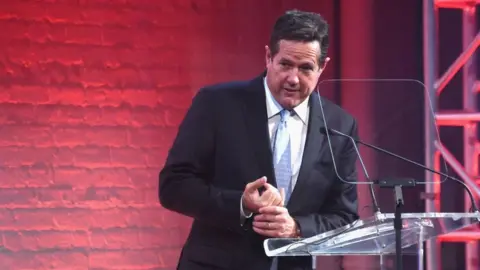Barclays sees off Edward Bramson as rebel investor concedes defeat
 Matt Greenslade
Matt GreensladeA rebel investor has lost in his attempt to join the board of Barclays after a large majority of shareholders voted against the plan.
Only 12.8% of shareholder votes backed Edward Bramson becoming a director at the bank's annual general meeting.
However, the lender came under fire over pay for top bosses, with a third rejecting its remuneration report.
Mr Bramson wants Barclays to shrink its investment bank to boost returns, but the bank says performance is improving.
Earlier, the activist investor told the BBC he wasn't "going anywhere".
He added that there was "an option" to keep Barclays' investment bank, but only if it could become a worthwhile asset for investors.
Mr Bramson's firm, Sherborne Investors Management, has amassed a 5.5% stake in the bank - making it Barclays' third largest shareholder, but short of having control.
That means he was able to attract only a further 3.8% of shareholder votes for his cause.
Mr Bramson argues that Barclays' investment bank is not profitable enough and that management should focus on the lender's retail bank.


Bramson may have his tail between his legs tonight but he is not leaving.
Selling up now would see him realise a loss of hundreds of millions of pounds on a stake he borrowed over a billion pounds to buy.
Barclays has struggled to make the investment bank earn enough to justify the capital required to run it and if that persists, Bramson may win round others to his cause.
Nevertheless. At half time, it's very much Barclays 1, Bramson 0.

 Getty Images
Getty ImagesBefore the AGM, major shareholder Aviva Investor expressed sympathy with his position, but declined to back him.
It said Mr Bramson was good at critiquing the bank but had not "offered a credible alternative strategy".
Earnings at Barclays' investment bank rebounded last year, rising 15%, although group profit was flat. Shares in the bank have fallen by a fifth in the past 12 months.
Addressing shareholders, Barclays' departing chairman John McFarlane said Barclays' board had unanimously rejected Mr Bramson's resolution, agreeing it would "destabilise" the bank.
"We've had a full 12 months of clean and respectable profits, producing earnings per share of 20 pence," Mr McFarlane said.
"When I joined, we were loss-making and dividends were paid from reserves. We've firmly drawn a line on the past."
Backlash on pay
In a blow for the bank, however, some 30% of shareholders voted against the pay of top bosses following a scandal that saw chief executive Jes Staley attempt to unmask a whistleblower.
Before the AGM, advisory group Institutional Shareholder Services (ISS) recommended shareholders vote against the report, arguing the remuneration committee had not properly sanctioned Mr Staley over the misconduct.
It noted the bank had been fined $15m (£11.5m) by US authorities over the affair.
And while Mr Staley was personally fined £642,000 by UK watchdogs, and the bank clawed back £500,000 of previous bonuses, Mr Staley was still paid a total of £3.4m for 2018, down from £3.9m in 2017.
After the vote on Thursday, which is non-binding, Barclays said: "We are disappointed in this outcome and will seek and reflect carefully on feedback from our shareholders."
